Blog posts
Science and Solutions for a Changing Planet DTP Conference 2015
The day after the PREDICTS Symposium it was the Science and Solutions for a Changing Planet (SSCP) DTP Conference 2015, in the same venue at the Natural History Museum! I got up early to help set up at the Museum and welcome delegates. This Conference was for members of the DTP and showcased our work with talks, a three minute thesis competition and poster session. The three minute thesis competition was a challenge to explain our theses to the audience in just three minutes using one static slide with a prize for the audience and judges’ favourite.
Check the Grantham Institute’s Storify for more Tweets from the event: SSCP DTP Conference
The PREDICTS Project Symposium
One of the research groups I am connected too – Projecting Responses of Ecological Diversity In Changing Terrestrial Systems (PREDICTS) has just come to the end of its first three years. To mark the occasion a one day symposium was held at the Natural History Museum with talks on overviews of what the project has achieved, the latest results, and a look ahead. I was invited to do a 15 minute talk on my PhD work researching human effects on soil biodiversity which use the PREDICTS framework. The Symposium was webcast live on YouTube and attended by many PREDICTS researchers past and present so I was rather anxious! However I did feel maybe feel slightly less nervous than my previous two talks, and even had a glimmer of enjoyment when answering questions at the end, which had been the part I most dreaded! I also received good feedback from the talk which was a boost to my confidence. Nearly a year into my PhD it was good to reflect on the progress I have made in presenting.
Rather than blogging the whole event here, check my Storify for Tweets from the event: PREDICTS Project Symposium
The programme of talks is also available at www.predicts.org.uk and will soon be accompanied by YouTube videos of the talks.
Throwback Thursday – Chasing flies in Scotland
This Throwback Thursday is from my trip to Scotland with the Dipterists Forum in September 2013, a wonderful week in the highlands collecting flies which I wrote up as a guest post for the Natural History Museum Curator of Diptera’s Blog.
Chasing flies in Scotland
Between handing in my MSc thesis and my viva voce, I was fortunate enough to have the opportunity to join Dipterists from the Natural History Museum on a collection trip to Scotland as part of the Dipterists Forum Autumn Field Meeting. Despite the daunting prospect of a long journey and sharing a cottage with people I barely knew I couldn’t pass up the opportunity for an intensive week studying flies which was also my first trip across the border.
I had a fantastic time, proving to me yet again that no matter how scary something seems it is always worth doing it anyway. I even had the honour of writing up the trip for Erica McAlister’s Curator of Diptera’s Blog, so rather than blog the trip here is
Field trips through the eyes of innocents….
Dipterists under the (double) rainbow, Knappach Cottage, Kingussie
Since the trip I have joined the Dipterists Forum committee and am now Treasurer. Sadly I have not had the time or money to go on another fieldtrip, but next summer’s is local to me in Kent, so hopefully I might be able to take a couple of days out and switch earthworms for flies!
Summer :)
HELLO ALL!!!!!!!! Hope everyone’s having a fantastic summer 🙂
The blog’s been a bit quiet for the past couple of months (actually silent). So far the holidays haven’t been a chance to relax, but overall they’ve been pretty good fun.
The last two weeks of term after exams were finished were filled with plans with my friends for pure fun, but in reality were filled with evil estate agents and looking at house after house (if we didn’t find anywhere we planned to camp out in the basement of Charing Cross Hospital with the vampire who lives there – long story…) We eventually found a house – really close to Charing Cross campus, which is where a lot of our 2nd year teaching will be. Many ICSM Clubs & Societies are based there too, so it’ll be great to only have to walk a few minutes to get home after clubs in the evenings – when I was living in Evelyn Gardens I had to get a bus. I’ll also be able to stay in bed for an extra 15 minutes in the morning (or alternatively get up at the same time and not be late to lectures…)
Speaking of Evelyn Gardens, there’s been a recent update. Bernard Sunley and Fisher will continue to house students this year due to a particularly large intake of freshers (It is really weird referring to others as freshers now that I no longer am one – hopefully (see below)). Furthermore, there is going to be ‘a feasibility study to consider the cost of future refurbishment works to secure the long term use of [Evelyn Gardens] as student accommodation’. I’m really pleased to hear this – many people, myself included, were sad to hear of its closure. I had a great time living in Willis Jackson, as did my aunt and uncle who met whilst living there in the 70s! Here’s hoping that many more IC students will have the chance to live there in the future.
I’m so excited for living with my best friends – unlike a lot of people who didn’t really know who they were going to live with until second or third term, my friends and I decided during first term. We’re lucky in that we don’t have to take the house on (and pay) for 12 months – we move in just before first term starts, and as we have a break-clause we can move out just after third term ends, saving us 3 months of rent. If this wasn’t the case, we’d have had to find somewhere cheaper. As it is, due to a change in financial circumstance I’m getting a lot less from student finance in this coming year, something I hadn’t realised when considering what my maximum budget for a house would be. Split over 9 months, my loan comes to £50 less than my rent per week, and that isn’t taking into account other expenses such as bills, travel and food. I’m going to be heavily relying on my savings and the Bank of Mum & Dad for the next year, and for third year I’ll have to think a lot more carefully over housing arrangements. London is definitely not the cheapest place to live and I’ve never learnt to budget before, so this next year will teach me a lot.
It was a relief to have housing sorted out (except sorting out things like guarantors and contacts) so for the next week I had a bit of time to relax after a hectic few months. Then I was off to Budapest with some people from Light Opera society. I’d wanted to visit Budapest for ages, and had an amazing time with some amazing people. We went to the thermal baths, went on a tour of the city, visited the Hospital in the Rock Museum (a secret emergency hospital dating back to WWII, in the interconnected caves beneath Buda Castle Hill), and listened to live traditional Hungarian Folk Music (absolutely beautiful!). I also visited a Cat Café near the hostel a couple of times 🙂 The holiday was a great opportunity to get to know some other Operites better (over vast quantities of cheap booze) and it was especially good as a couple of final years came before going off to start their doctoring – sadly we won’t get to see them as much from now on 🙁
Second year results came out on our second day in Budapest, and they’d all passed (yay!) Ours came out a week later and everyone had passed – except me. I’d expected it, but it was still a disappointment, and I was lucky to be surrounded by such lovely, supportive people. I’ve said it before and I’ll say it again: Opera’s a family, and we’re all there for one another.
So when I got home the revision started, with just over three weeks to go until the exams. I’d only failed LSS2 – however as the mark for Life Support Systems is an average of LSS1 and LSS2, I had to resit both papers. Although it wasn’t much fun revising I think it’s put me into a better place for second year, and I now have a much better set of notes for LSS! My anatomy notes are especially good – probably because they’re a copy of my friend Beth’s…
During that period of revision I was in London every Monday so each week I met up with my personal tutor. He has supported me both academically and from a welfare perspective, and in all honesty I could not have got through first year without his support. He was so helpful with my revision – explaining to me the bits of LSS I didn’t understand and spending hours going over things with me. He taught a lot of the first year respiratory course, and after his tutoring I’d definitely say I know more respiratory than anything else.
I know a lot of people who would have been far more upset than I was if they’d failed, and even have friends who would have been hugely disappointed with not getting a distinction (not that there was ever any doubt that they would….) I, on the other hand, am extremely proud that I only failed one exam and passed everything else. The past year has been difficult for me due to a long-term health condition. Furthermore, during the past term the faculty has put me under a lot of pressure about accommodation for next year. Simply put, they want me to spend another year in halls and I don’t. I understand that this suggestion was made entirely with my welfare in mind, but I think I have a better idea about what’s good for me than they do. The idea that I should live in halls appeared to mainly be based on past experiences the faculty had had with other ‘welfare students’ – simply put, I felt as though I wasn’t being considered as an individual.
All of this was going on during third term, when we were learning the stuff for our LSS2 exam as well as trying to revise everything from second term as well. The pressure I was under was making it difficult to concentrate, so unsurprisingly it was LSS2 that I failed. Although I probably should have done a bit more revision too….
Resit results come out on 9th September and I’m feeling fairly confident. I have mitigating circumstances meaning that if I fail I get to redo first year rather than being kicked out, but I’ve fought so hard not to have to take an interruption of study that it would be a huge disappointment to have to redo first year anyway.
I’m looking forward to starting second year in a far better place than I did first; my health has improved a lot lately and I feel better than I have in a long time; also, I’ll already have all my friends around me.
After two hectic months it will be good to have a more relaxed month before diving head-first into second year – which is apparently a tough one. So before going back I’m planning to learn to sew properly before being costume mistress for 24 Hour Opera next May, and I’m going to read lots (thank you to those who commented on my last post with book suggestions!) And most importantly, I’m going to spend time with both my cats (who are my best friends and my babies and I’m going to miss them so much when I’m back in London!) I got my kitten Jemima just after exams, and she is the cuddliest cat ever – I’m definitely going to miss her snuggles in the mornings! (As I write this, she’s trying to destroy the curtains.)
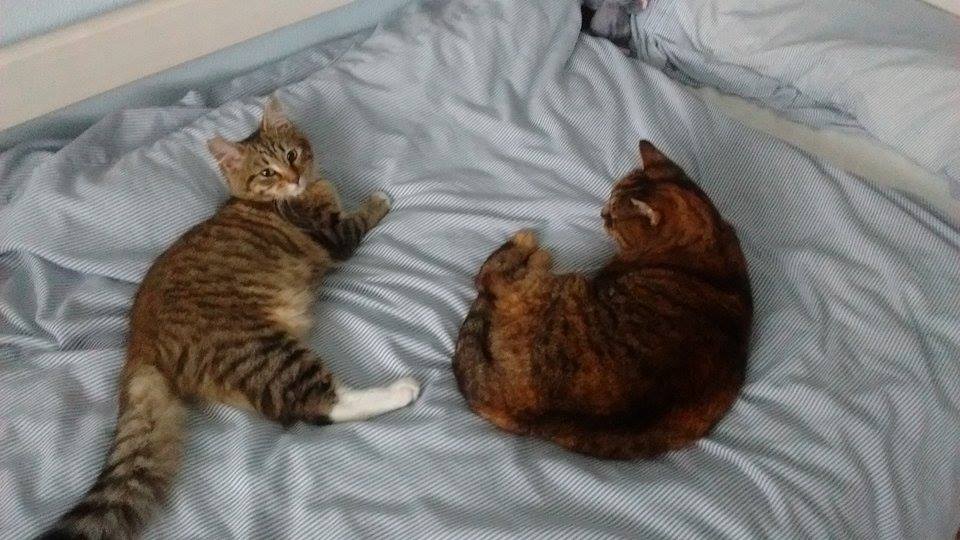
So I think that’s pretty much everything that’s been going on (other than a family holiday to France where it was either really hot, or cold with torrential rain…)
And finally…
CONGRATULATIONS TO ALL THE NEW IMPERIALITES STARTING IN OCTOBER (especially the medics)!
If you missed out on a place, don’t give up! With medicine, there’s always the option of doing an undergraduate degree in a related subject and then going on to doing a 4-year graduate-entry medicine course. You can do it, I believe in you!!!
Much love,
Em xx
Throwback Thursday – Balcony Beasties
This week’s Throwback Thursday is about the cabbage white butterflies I had on my London balcony back in August 2013 while I was studying for my MSc. This also formed the basis of an article in the Amateur Entomologist’s Society Bug Club Magazine.
Balcony beasties – cabbage whites and their enemies
It is true you do not have to go far to see wildlife, even in the midst of a big city. Invertebrate scholars are particularly fortunate in this regard as insects, arachnids etc. really are everywhere, in your home and even on you. Here in my student room in Earls Court, London I have a little balcony which I have used to grow salad and tomatoes. Being an entomologist I soon became more interested in the creatures eating my vegetables (and eating them!) than the produce.
Throwback Thursday – A weekend of hoverflies (August 2013)
This week’s Throwback Thursday covers a course on hoverfly identification I attended in August 2013 as part of a qualification in Biological Recording and Species Identification.
Flat success!
Last week I went down to London with my mum and sister to continue searching for flats for next year. My other two housemates are in Japan and Southampton at the moment so the responsibility fell to me!
It’s hard to find a place around Imperial campus close enough to walk, which is what we really wanted, having lived further out in first year and not enjoyed the experience of getting the bus everyday through London traffic (especially early in the morning or on Friday night). Obviously most of the closest areas to Imperial (South Kensington and Chelsea for example) are far too expensive for us to find anywhere suitable, so we ended up looking around Earls Court, Fulham and West Kensington.
We looked round some really really awful places which needed burning to the ground rather than someone paying £650 a week (!) to live there….
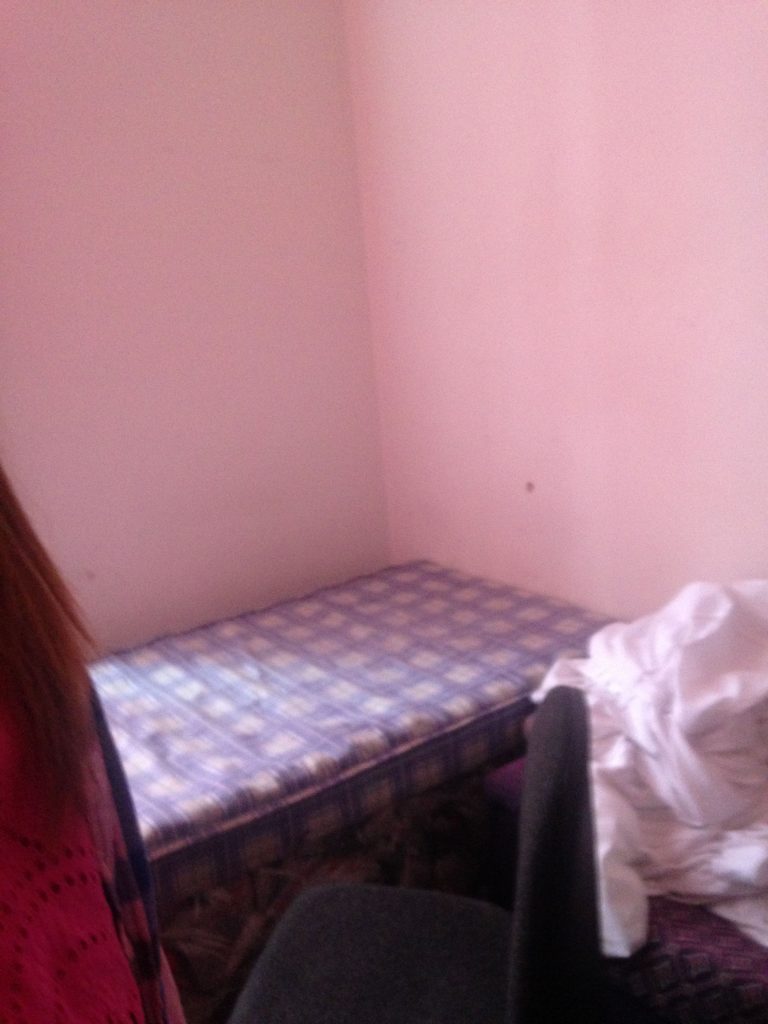
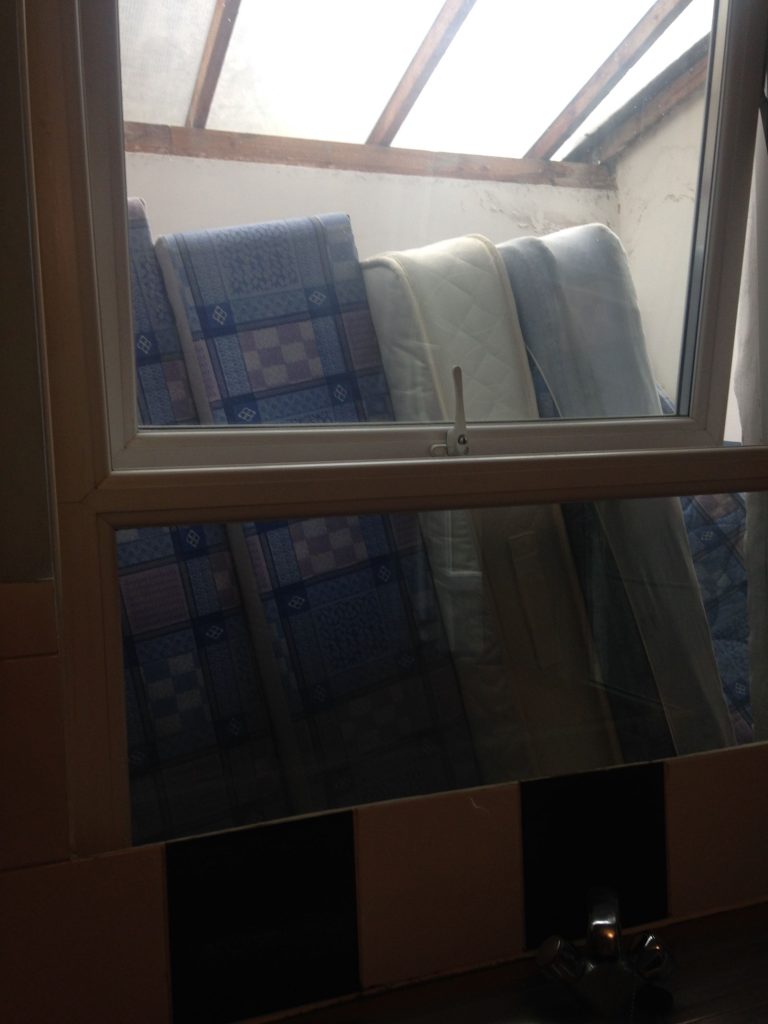
And also some amazing places that would have been the best if we were all ready to work five jobs and not eat next year…

Eventually, we found a Goldilocks flat, near to West Brompton tube. It is neither a damp hole in the ground nor a mansion that will bankrupt us, so if we can just get the paperwork signed (a tricky thing when everyone is on holiday) we have finally found somewhere to live!
Useful places to look for houses in London:
Imperial home solutions website. This is a bit hit and miss however—some of the worst places we saw were from here! (But also the one we eventually got.)
Estate agents in the area—we have used Broadway and West and Foxtons as well as loads of others. They charge agency fees as well as fees for paperwork which can sometimes be a lot. On the other hand they can be very helpful, especially the first time you rent a house as you have someone to ask questions to and who will drive you around from viewing to viewing!
We also used websties like Zoopla and Rightmove as well as Evening Standard Rentals, Gumtree, Prime Location etc. etc.
I hope everyone else is enjoying their holidays (and not worrying too much if you are still waiting for your A-Level results!)
My first music festival – with science!
I enjoy music, but until now had never been to a music festival, all those crowds of people, loud noise and camping was not something I thought I could cope with. However I was aware from talking to my colleagues at the University of Reading last year that festivals are not just about music, and often have stands and science activities run by universities and other institutions. This felt like something I would enjoy so I put it on my mental list of ‘things to do while studying for a PhD’. I was very excited to see a call from the Royal Society of Biology and British Ecological Society for volunteers to help run ecology themed activities and bioblitz (an event where you try to identify as many species as possible) at Latitude Festival in Suffolk. I duly applied and a few weeks later was off on a big adventure with my tent and sleeping bag!

I picked up my festival wristbands and met up organiser Penny Fletcher and some of the rest of the team I would be working with the for the next few days – getting introduced to the ‘Big Biology Bus’ – a mobile home decked out with insect photographs and information to be used for activities. The first evening was spent preparing for these activities, cutting out plants for the ‘Power of Plants’ activity where children choose which plants and features to include in their virtual garden made of paper and learn about what makes a wildlife-friendly garden.
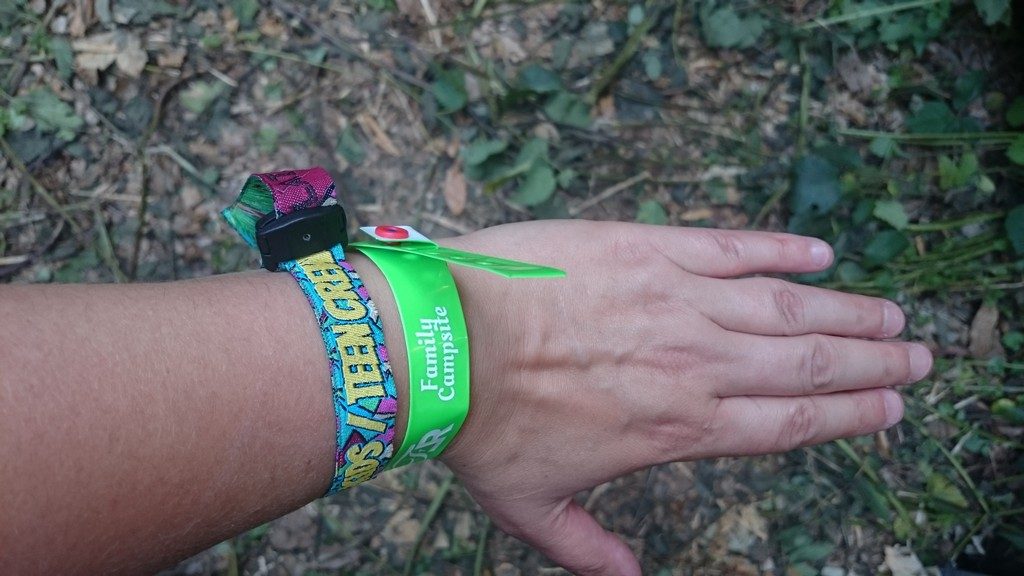
Then followed my first night in a tent since my family holidays as a young teenager, it was not a very restful sleep and the portable toilets and showers were as grim as I expected, although better than usual I was told, since we were in the performers’ area. I could have paid for b&b or ‘glamping’ but considered coping with camping to be part of the experience! The day before we officially opened to the public was spent scouting out suitable areas for bug hunts and setting up more activities, including making a butterfly life-cycle mobile from Butterfly Conservation and dragonflies out of pipe-cleaners and lolly sticks – it was good fun!
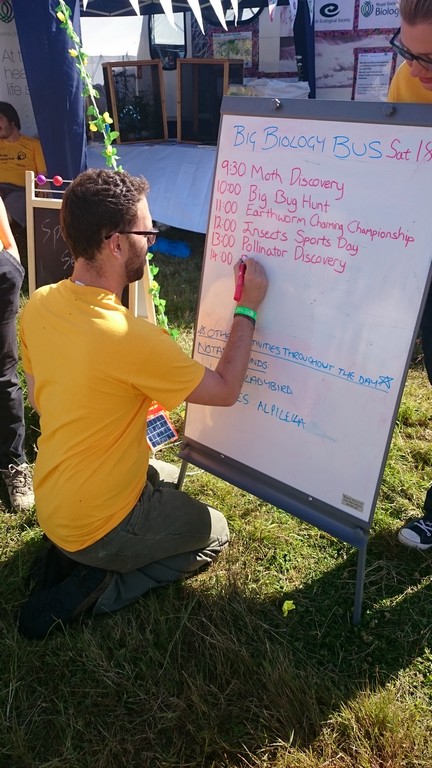
The day started with opening the moth trap, with expert Marc Botham from the Centre for Ecology & Hydrology showing members of the public the moths and other insects trapped in the light trap which was left over night and adding to our species list for the Latitude site. Then it was off to inspect the pitfall traps that colleague Sara Ball had set out to catch beetles and see what other insects could be found on a public bug hunt – demonstrating beating (hitting a tree with a stick to knock insects off), sweep netting (sweeping a net through vegetation) and looking under logs.
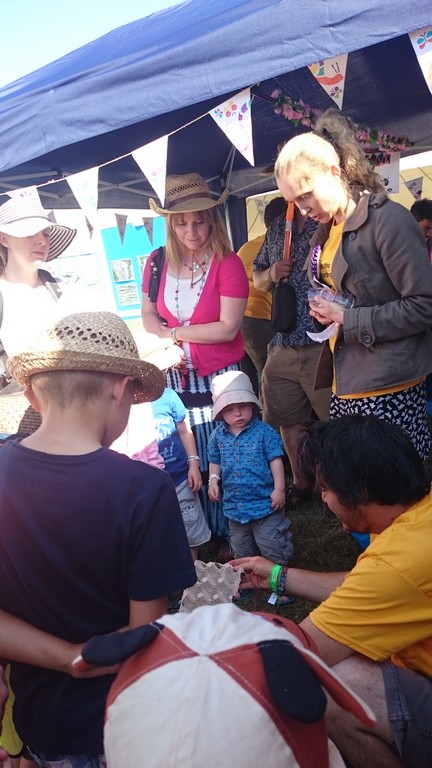
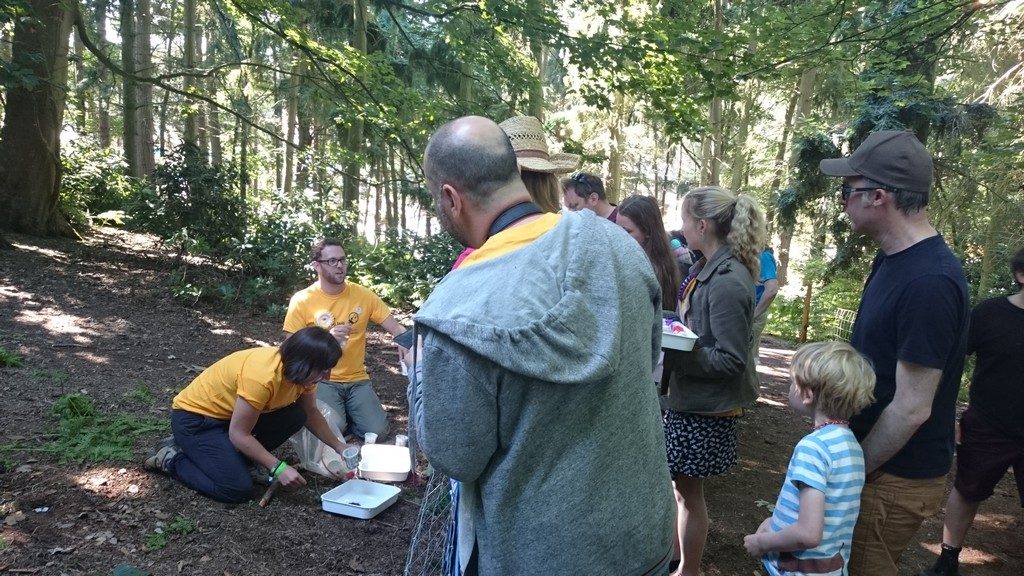
Kieron Brown from the Earthworm Society of Britain ran earthworm charming competitions, where the public has to make noise to drive earthworms out of the ground (it is thought to mimic the noise of moles or rain and force them to move upwards to escape). The soils here were very dry and sandy so not many earthworms were found but people still enjoyed learning about them and making lots of noise!
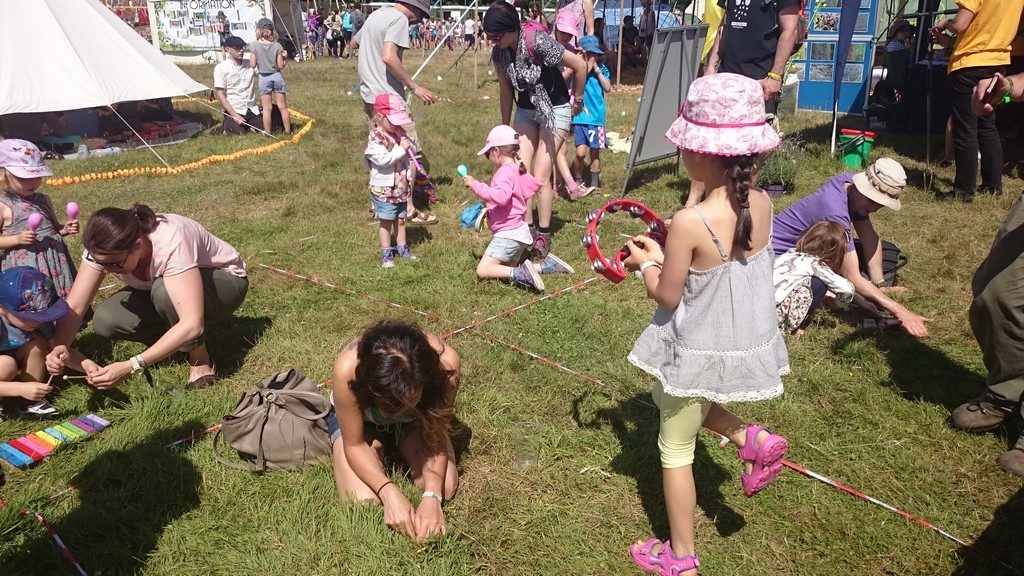
Ladybird expert Helen Roy of the UK Ladybird Survey gave talks on ladybirds and their parasites, accompanied by singing parasitised ladybird David Urry. In addition to craft activities, another event throughout the day was an insect sports day were people chose insect species to ‘compete’ in events such as high-jumping and sprint to see who would win and then see how they measured against them (my long jump was a pathetic 60 cm!). The public were also invited to vote for their favourite insect and could examine some of the invertebrates we had found during our bug hunts.
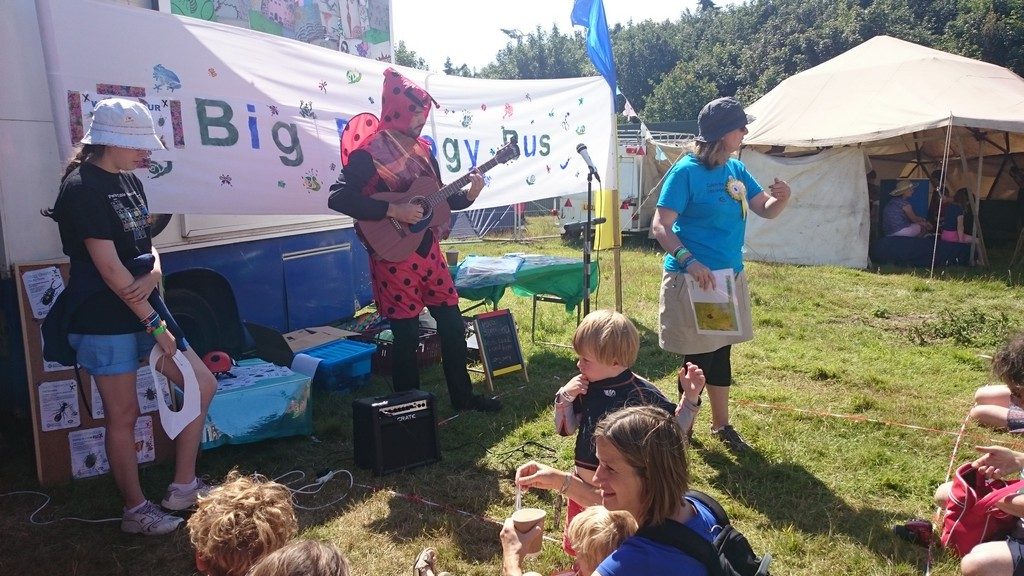
It sounds like I didn’t really see much else of the Festival, and to be honest I didn’t really! I was much happier hunting for insects and adding to the species list for the bioblitz than going to see the acts, although I did go see a comedy show and listened to Portishead and The Vaccines from a safely muted distance.


After three days of insect activities, bioblitzing and portaloos I was back off home, and sensibly I had taken the Monday off to recover. I had a fantastic experience – challenging, exhausting and fun in equal measure! and would definitely do something similar again. For more photographs and videos check out Twitter and Vine.
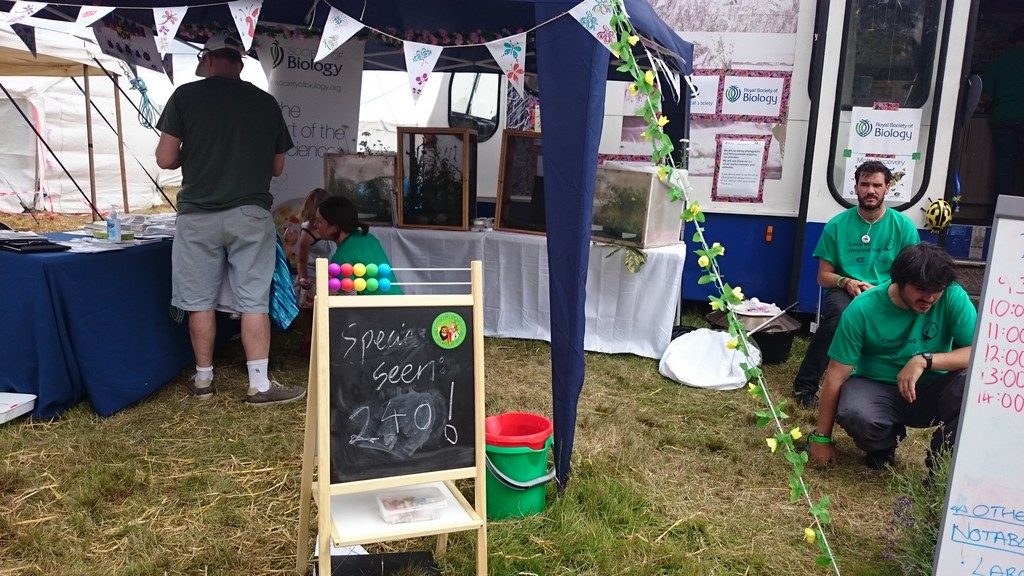
Bugs! day at Imperial College Silwood Park
I’ve been a bit lax with my blogging over the last few weeks as I have been busy writing and submitting my early stage assessment – a report of what I have done so far in my PhD and what I plan to do next. This will be followed up with a short viva from my panel – eek! So it was good to get a day out doing outreach at Imperial College Silwood Park a few days after submitting. Silwood Park is Imperial’s postgraduate campus near Ascot, Berkshire, with research and teaching in ecology, evolution, and conservation. One of my supervisors is based there, so I occasionally visit for meetings and eventually will be going there to extract and analyse microbial DNA from my soil samples.
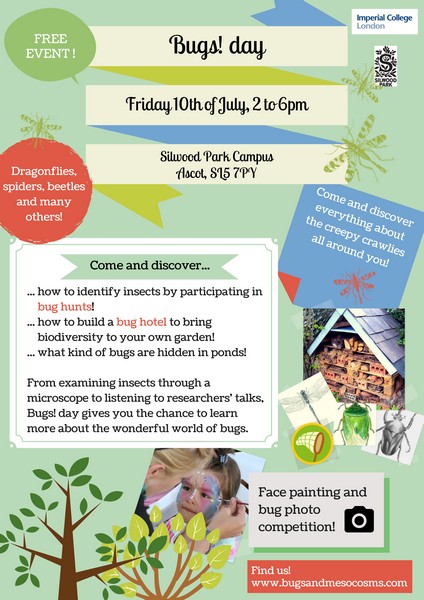
This time I was visiting for the Grand Challenges in Ecosystems and the Environment (GCEE) Bugs! event which brought together Imperial College researchers and local wildlife groups for a day off engaging visitors in research, bug hunts and pond dipping. I was exhibiting some of the invertebrates that can be found in leaf litter, encouraging people to sieve them from the leaves and examine them under the microscope.

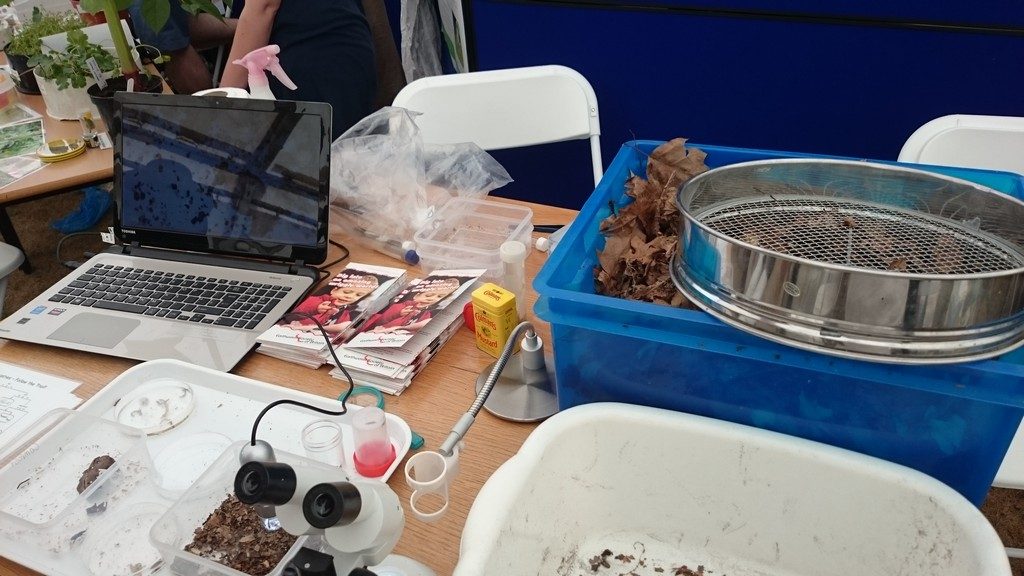
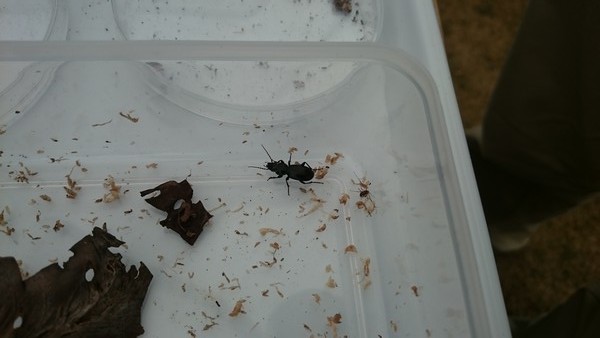
Other stands had activities to extract DNA from strawberries, examine aphids and their predators and parasites and fossil insects. I had a really enjoyable day finished off with a BBQ. More information and photographs from the day can be found on the Bugs! website.




